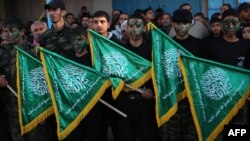Amnesty International says Palestinian armed groups committed war crimes by firing rockets and other crudely built, indiscriminate projectiles into Israel during last year's conflict in the Gaza Strip.
The Palestinian groups "displayed a flagrant disregard for international humanitarian law and for the consequences of their violations on civilians in both Israel and the Gaza Strip," Amnesty said in a report Thursday.
At least six civilians, including a 4-year-old boy, were killed by the Palestinian rockets and mortars, which were launched by militant Islamist groups including Hamas and the al-Qassam Brigades.
"All the rockets used by Palestinian armed groups are unguided projectiles which cannot be accurately aimed at specific targets and are inherently indiscriminate," the report said, adding that mortars are also imprecise munitions.
In a case that illustrates the unreliability of such weapons, Amnesty said 13 Palestinian citizens were killed, including 11 children, when a projectile launched by an Islamist group landed in Gaza's al-Shati refugee camp.
Over 1,500 Palestinian civilians, over 500 of whom were children, were killed during Israel's 50-day bombing campaign of Gaza during July and August of last year. Sixty-six Israeli soldiers and six civilians were also killed in Israel.
Amnesty repeated its accusation that some of the Israeli attacks during the conflict also amounted to war crimes. In November, it issued a report saying Israel had fired missiles into Gaza that killed entire families and destroyed homes.
"But violations by one side in a conflict can never justify violations by their opponents," the new report said.
Out of approximately 4,800 rockets that were fired from Gaza toward Israel, about 224 are estimated to have fallen in residential areas, according to the U.N. Many of the projectiles were either intercepted by Israel's missile defense system or allowed to land in uninhabited areas.
Civilians unprotected
The Amnesty report criticized Israeli authorities' "failure to adequately protect civilians in vulnerable communities, particularly Bedouin villages in Israel's Negev/Naqab region." Since many of the unrecognized Bedouin villages lie in what Israel refers to as "open areas," the country's missile defense system does not intercept projectiles headed toward the area.
Israel says its military campaign, which also included a ground offensive, was meant to stop Palestinian rocket fire from Gaza and to destroy tunnels that militants have used to enter Israel. It accused Palestinians of exploiting civilians as human shields and using U.N. facilities to carry out attacks.
Amnesty's report detailed what it said were instances where Palestinian armed groups launched attacks or stored munitions near displaced civilians. It accused some groups of storing rockets and other artillery in civilian buildings, including U.N. schools.
The U.N. has condemned Palestinian groups for using its facilities to store weapons and says it acted quickly to remove the weapons as soon as they were discovered.
Amnesty lamented what it called the "entrenched impunity" that has allowed both sides to commit war crimes. The international community should end "transfers to Palestinian armed groups and Israel of all arms and military equipment that could be used to commit serious violations of international humanitarian law," it said.
Criticism of settlement policy
Meanwhile, the United Nations' Middle East envoy, Robert Serry, criticized Israel's settlement building, saying it "may kill the very possibility of reaching peace on the paradigm of two states for two peoples."
"The minimum conditions of trust cannot be restored without a new Israeli government taking credible steps to freeze settlement activity,” Serry said Thursday in his final briefing to the U.N. Security Council.
Serry also said he was concerned about the recent comments by Israeli Prime Minister Benjamin Netanyahu on the future of the Middle East peace process.
In the hours before Israel's election last week, Netanyahu angered the U.S. and others by taking a tough stance toward the Palestinians and saying a Palestinian state would not be established on his watch in the current climate of regional chaos and violence.
Resolving the conflict between Israel and the Palestinians in a two-state solution is a key U.S. foreign policy priority.
Serry — who has served in his position for seven years and will be replaced by Bulgarian diplomat Nickolay Mladenov, who has served as the U.N. envoy in Iraq — told the council in his parting thoughts that the Israeli-Palestinian peace process had become a "can [that] is kicked down an endless road."
He suggested that the council could step in, at the appropriate time, to present a "framework for negotiations, including parameters" to achieve peace.
Some information for this report came from AFP.





